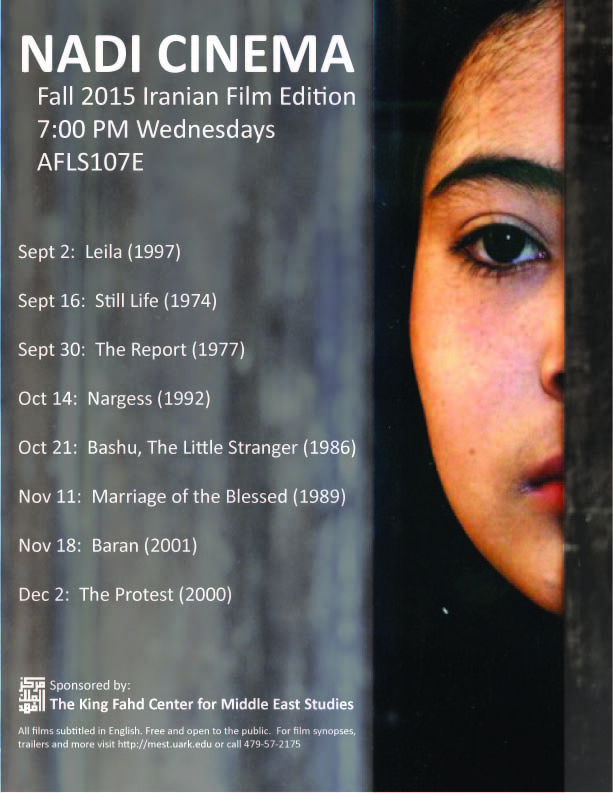From the Egypt to Saudi Arabia, Nadi Cinema introduces viewers to the storytelling and vision of filmmakers across North Africa and the Middle East. The Fall 2015 line-up will feature eight films from Iran produced before and after the revolution.
Iranian films have won numerous international awards, including the Oscar and Golden Globe, the Cannes Film Festival's Golden Palm and Jury Prize, the Venice Film Festival's Golden and Silver Lion, and the Berlinale's Golden and Silver Bear. These films approach personal as well as social and political themes, addressing war, revolution, colonial resistance, dictatorship, nationalism, modernization, ethnic strife, feminist struggle, divorce, the influence of communism and the West, and the enduring role of tradition and faith. The screenings will provide a unique opportunity to reflect on the changes in Iranian society and culture under the Pahlavi dynasty and the Islamic Republic.
All films — classics, cult favorites, recent hits, comedies, tragedies, political thrillers, social commentaries, and romances, in black-white and living color — are subtitled in English. Screenings will take place in the Hembree Auditorium, room 107E in the Agricultural Food and Life Science building (AFLS), next to the Pat Walker Health Center on Maple Ave. Screenings begin at 7 p.m. and are free and open to the public.
- Sept. 2 – In his films after the Islamic Revolution, Dariush Mehrjui focuses on the issues of the middle-class Iranians. Leila, part of a trilogy dealing with the experience of Iranian women, is the devastating story of Leila and Reza, a happily married couple must confront Leila's infertility and the pressure of an overbearing mother-in-law who insists her son must have a son.
- Sept. 16 – The fall 2015 season begins with Still Life (1974), directed by Sohrab Shahid Saless. Winner of the Silver Bear at the Berlin Film Festival, Still Life portrays the routine simple life of an elderly railway crossing guard and his wife living in solitude at a remote rail junction, which is broken by his forced retirement.
- Sept. 30 – From Abbas Kiarostami comes The Report (1977), a rare early film made before the Islamic Revolution, was his first film with an adult theme and professional actors. It follows a brash tax investigator with financial problems and troubles both at work and home.
- Oct. 14 – In Nargess (1992) director Rakhshan Bani-Etemad tells the tragic story of a love triangle. Afagh, an aging thief who has lost her beauty, is on the verge of losing her young lover, Adel. When Adel meets the beautiful Nargess, he decides to go straight, but honest work does not come easily, and he decides to go back to the old life for one last job.
- Oct. 21 – In Bahram Bayzaie's Bashu, The Little Stranger, Bashu, a young boy from Khuzestan near the Persian Gulf, escapes to northern Iran by the Caspian Sea after witnessing the death of his family in the Iran-Iraq War. His adoption by Na'i, a single mother whose husband is away, leads to many social, cultural, linguistic, and racial struggles.
- Nov. 11 – From director Mohsen Makmalbaf comes Marriage of the Blessed (1989), the story of Haji, a shell-shocked young revolutionary war photographer severely traumatized by the war with Iraq. Back from the front, he's unable to adapt to civilian life. Despite family opposition, his fiancée stands by him as together they challenge both the authority of family and state to lead their own lives.
- Nov. 18 – From Majid Majidi, best known for Academy Award nominee Children of Heaven (1997), comes Baran (2001). In a building site in present-day Tehran, Lateef, a 17-year-old Turkish worker is irresistibly drawn to Rahmat, a young Afghan worker in a poignant romantic fable that combines a moving narrative of a Sufi love tale with a political critique of the harsh conditions of Afghan refugees in Iran.
- Dec. 2 - Masud Kimiai's The Protest (2000), pulled from the theaters after only a month, presents the changes in Iranian society and the struggles of a new generation of Iranian youth during Khatami's first-term presidency (1997-2001).
All eight film screenings are free and open to the public, and all are subtitled in English. Nadi Cinema is sponsored by the King Fahd Center for Middle East Studies in the J. William Fulbright College of Arts and Sciences.
For film synopses, trailers and more information visit Nadi Cinema on the King Fahd Center webpage, or follow the Center on Facebook and Twitter.
Topics
Contacts
Nani Verzon, HEI program coordinator
Middle East Studies Program
(479) 575-2175,
